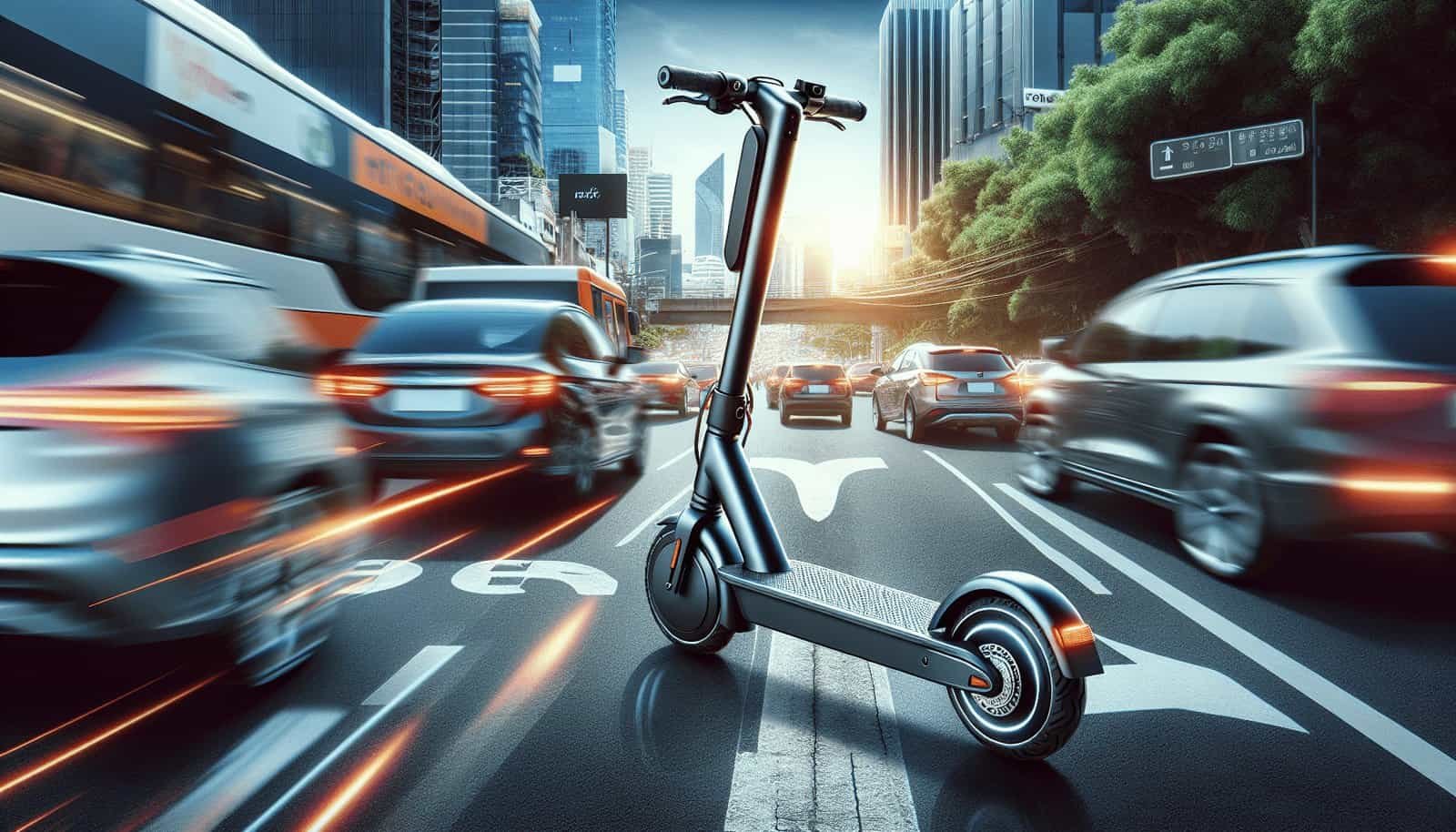Are you curious if your sleek electric scooter can be utilized for popular ride-hailing services such as Uber or Lyft? Well, the answer is not as straightforward as you may hope. While electric scooters offer a convenient and eco-friendly mode of transportation, their compatibility with these platforms is dependent on various factors. Join us as we uncover the vital considerations that determine whether your electric scooter can hit the streets as a rideshare vehicle, providing you with all the information you need to make an informed decision.
Understanding Rideshare Services
What are rideshare services?
Rideshare services, such as Uber and Lyft, are platforms that connect passengers with drivers who offer transportation services in their own vehicles. These services have revolutionized the way people travel, providing an alternative to traditional taxis and public transportation.
Popular rideshare platforms
Uber and Lyft are the two most well-known and widely used rideshare platforms. These companies operate in numerous cities around the world and have millions of active users. In addition to Uber and Lyft, there are also other local and regional rideshare platforms that may be popular in specific areas.
Requirements to become a rideshare driver
To become a rideshare driver, there are certain requirements that you must meet. These requirements vary depending on the rideshare platform and the location where you plan to drive. Generally, you will need to meet criteria such as having a valid driver’s license, passing a background check, and meeting the minimum age requirement. Some platforms may also require you to have a certain type of vehicle or pass a vehicle inspection.
Electric Scooters and Rideshare Services
Are electric scooters allowed?
Whether or not electric scooters are allowed for rideshare services like Uber or Lyft depends on the specific policies and regulations in the area where you plan to provide services. Some cities have embraced electric scooters as a form of alternative transportation, while others have stricter regulations or outright bans.
Different modes of transportation permitted
Rideshare services typically allow drivers to use various types of vehicles, including cars, motorcycles, and bicycles. In some cities, electric scooters are also permitted. It is important to check with the rideshare platform and local authorities to ensure that electric scooters are allowed and comply with any specific requirements.
Benefits of using electric scooters for rideshare
There are several benefits to using electric scooters for rideshare services. First and foremost, electric scooters are environmentally friendly, producing zero emissions and reducing air pollution. Additionally, electric scooters are smaller and more maneuverable than cars, making them well-suited for navigating crowded urban areas and reducing traffic congestion. They are also more affordable to operate, as they require less maintenance and have lower fuel costs compared to cars.
Legal and Safety Considerations
Local regulations and laws
Before offering rideshare services with an electric scooter, it is important to familiarize yourself with the local regulations and laws regarding their use. Some cities may have specific rules and restrictions for electric scooters, such as speed limits, designated biking lanes, and helmet requirements. It is crucial to comply with these regulations to avoid fines or legal trouble.
Safety guidelines for rideshare drivers
Safety should be a top priority for rideshare drivers, regardless of the type of vehicle they are using. When using an electric scooter for rideshare services, it is important to wear a helmet and other protective gear, follow traffic laws and signals, and be aware of your surroundings. Additionally, it is advisable to complete any necessary training or certifications related to scooter operation and road safety.
Insurances and coverage
Insurance coverage is an essential consideration for rideshare drivers. Rideshare platforms typically provide liability insurance coverage while you are actively driving for their platform, but this coverage may not extend to all aspects of your rideshare activities. It is recommended to consult with insurance professionals who can help you understand the specific coverage options available for rideshare drivers using electric scooters.
Ride Quality and Customer Experience
Comfort and convenience for riders
One important aspect of rideshare services is providing a comfortable and convenient experience for passengers. While electric scooters may not offer the same level of comfort as cars, there are still measures you can take to enhance the ride quality. These include ensuring that the scooter is well-maintained and in good working condition, providing clear and concise directions to passengers, and ensuring that passengers have a safe and secure place to hold onto while riding.
Charging and battery life
Electric scooters require regular charging to maintain their operational performance. It is essential to plan and manage your charging schedule effectively to ensure that you have enough battery life to serve customers without interruptions. This may involve identifying and utilizing charging stations in convenient locations or investing in portable chargers to keep with you during your rideshare shifts.
Handling various road conditions
As a rideshare driver, you will encounter various road conditions, ranging from smooth pavements to uneven surfaces and potholes. When using an electric scooter, it is essential to be familiar with its handling capabilities and adjust your driving accordingly. This includes adapting your speed and being cautious when riding on rough or slippery surfaces to ensure both your safety and that of your passengers.

Availability and Demand
Location-specific demand for electric scooters
The demand for electric scooter rideshare services can vary significantly depending on the location. Urban areas with heavy traffic and limited parking spaces often have higher demand for rideshare services overall, including electric scooters. Additionally, cities with a strong emphasis on sustainable transportation and eco-friendly initiatives may have a greater demand for electric scooter rideshare options.
Market competitiveness
The rideshare industry can be highly competitive, and electric scooter rideshare services are no exception. It is essential to assess the level of competition in your area and understand how it may impact your earning potential. Factors such as the number of other rideshare drivers, the popularity of different platforms, and the availability of electric scooters can all influence the competitiveness of the market.
Risks of low demand and availability
One potential challenge of using electric scooters for rideshare services is the risk of low demand and availability. If there is not enough demand for electric scooter rides, it may be challenging to consistently secure enough customers to make your rideshare venture financially viable. Similarly, if there is a limited supply of electric scooters in your area, it may be difficult to find an available scooter when you need one.
Challenges of Using Electric Scooters
Limitations on distance and speed
Electric scooters have certain limitations when it comes to distance and speed. While they are a practical and efficient mode of transportation for short distances, they may not be suitable for longer trips or rides with time constraints. Additionally, electric scooters generally have lower maximum speeds compared to cars, which may impact your ability to reach customers quickly.
Weather conditions and seasonal challenges
Weather conditions can pose challenges for rideshare drivers, particularly when using electric scooters. Rain, snow, or extreme heat can impact the safety and overall practicality of using an electric scooter. Some cities may experience seasonal variations in demand for rideshare services, and it is important to consider how weather conditions may affect your ability to operate as a rideshare driver.
Handling multiple trips between charges
Managing multiple trips between charges can be a logistical challenge when using electric scooters for rideshare services. Unlike cars, which have substantially longer driving ranges, electric scooters may require more frequent charging. This may involve planning your routes carefully to minimize the distance between customers and charging stations or carrying portable battery chargers to extend your range.
Cost Considerations
Initial investment in an electric scooter
One of the primary cost considerations when using an electric scooter for rideshare services is the initial investment to purchase the scooter itself. Electric scooters can range in price depending on the brand, features, and specifications. It is essential to research and choose a scooter that meets your specific needs as a rideshare driver while also fitting within your budget.
Ongoing maintenance and repair costs
Like any vehicle, electric scooters require regular maintenance and occasional repairs. It is important to factor in these ongoing costs when calculating the overall financial feasibility of using an electric scooter for rideshare services. Regular maintenance may include tasks such as tire rotations, brake checks, and battery replacements. Additionally, it is advisable to allocate some funds for unforeseen repairs and emergencies.
Fuel and operating expenses
One significant advantage of using electric scooters for rideshare services is the reduced fuel and operating expenses compared to traditional gas-powered vehicles. Electric scooters generally have lower energy costs, allowing you to save money on fuel. Additionally, maintenance costs for electric scooters are often lower due to their simpler mechanics and fewer components prone to wear and tear.
Earning Potential and Profitability
Calculating potential earnings
Understanding the earning potential of using an electric scooter for rideshare services is crucial when evaluating its financial viability. Factors such as the number of trips you can complete in a given time frame, the rates set by the rideshare platform, and the level of demand in your area all contribute to your potential earnings. It is important to do research and consider both the potential income and associated expenses to determine profitability.
Factors affecting profitability
Several factors can affect the profitability of using an electric scooter for rideshare services. These include the cost of charging the scooter, the rates set by the rideshare platform, the level of competition in your area, and the demand for electric scooter rides. Additionally, factors such as mileage reimbursement, taxes, and any fees imposed by the rideshare platform can impact your overall profitability.
Evaluating financial viability
When evaluating the financial viability of using an electric scooter for rideshare services, it is crucial to take into account all costs associated with owning and operating the scooter, as well as potential earnings. Consider your anticipated expenses, such as scooter purchase and maintenance, charging costs, insurance premiums, and taxes. Compare these expenses to the potential income you can generate as a rideshare driver to determine if using an electric scooter is financially viable for you.

Other Factors to Consider
Age and condition of your electric scooter
The age and condition of your electric scooter can significantly impact its performance and reliability. It is important to regularly inspect and maintain your scooter to ensure that it is in optimal working condition. Consider factors such as the battery’s health, the overall mechanical soundness of the scooter, and any wear and tear that may affect its safety and operational efficiency.
Availability of charging stations
The availability of charging stations in your area is a crucial consideration when using an electric scooter for rideshare services. Having convenient access to charging stations can facilitate your ability to operate consistently without interruptions. Research and identify the locations of charging stations in your area and factor this information into your rideshare plans.
Competition from other rideshare drivers
Competition from other rideshare drivers, both using electric scooters and other modes of transportation, is an important factor to consider. The level of competition can impact your ability to secure customers and earn income. It is essential to gauge the market saturation in your area and differentiate yourself by offering excellent customer service, timely pickups, and safe transportation.
Conclusion
Using an electric scooter for rideshare services like Uber or Lyft can be a feasible and environmentally friendly option, depending on various factors. By understanding the requirements, legal considerations, and safety guidelines, you can ensure compliance and provide a positive customer experience. Assessing availability and demand, considering challenges and costs, and evaluating profitability will help you make an informed decision about incorporating electric scooters into your rideshare business. Remember to also consider personal factors such as the age and condition of your scooter, the availability of charging stations, and the level of competition in your area. With careful consideration and planning, using an electric scooter for rideshare services can be a practical and rewarding venture.




